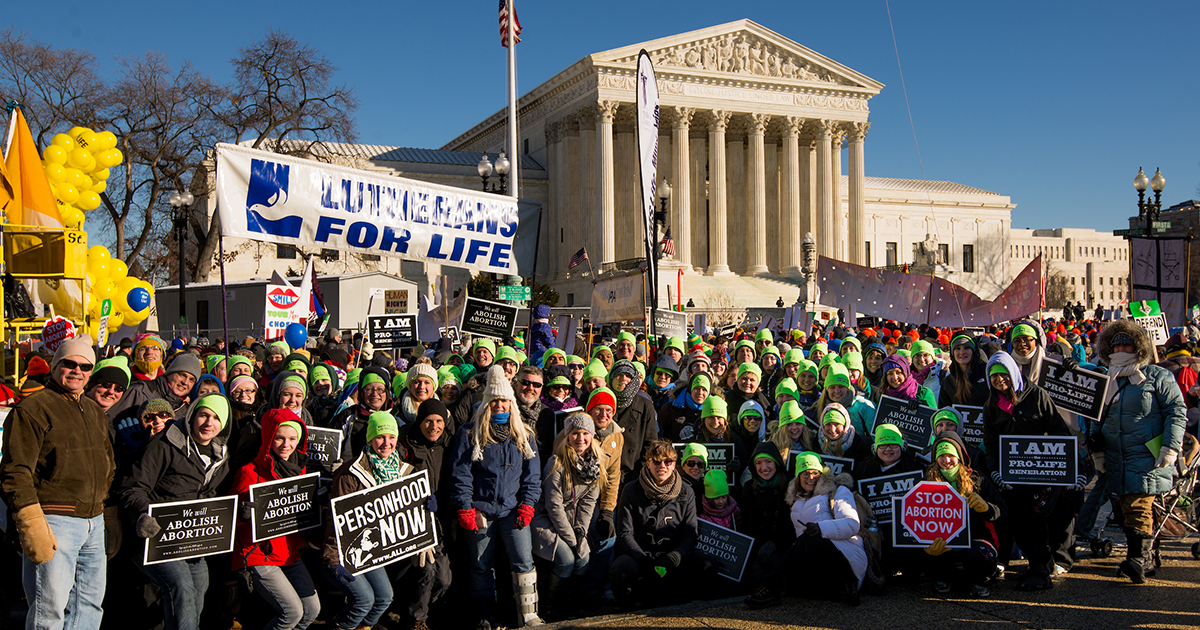
By Jonathan Lange
Last week, the U.S. Supreme Court handed down a decisive victory for the work of pro-life pregnancy centers and for free speech in general.
“We rejoice at this ruling,” said the Rev. Michael Salemink, executive director of Lutherans For Life. “It safeguards fairness and freedom. Pregnancy resource centers share a truth and show a love that saves lives. They serve with the compassion of our Savior Jesus. Removing obstacles to these interactions and relationships certainly enhances this outreach.”
The case began when California passed the “Reproductive FACT Act” in 2015, requiring pro-life pregnancy centers with a medical license to advertise free or low-cost abortions offered through the state. Pregnancy centers not needing a license were forced to say so in a 29-word statement translated into multiple languages and posted “conspicuously.” Moreover, this statement must be printed on all advertising materials in a font size at least as large as the words of the advertisement.
In response to the law, the National Institute of Family and Life Advocates (NIFLA) sued to halt its enforcement, arguing that the law unconstitutionally compels speech that is opposed to the very mission of these pregnancy centers.
Established case law requires that whenever a government deems it necessary to alter the content of speech, it must meet the “strict scrutiny” standard. That means the onus is on the government to prove that the alteration 1) meets a compelling government interest, and (2) does so in the least restrictive way possible.
However, the Ninth Circuit Court of Appeals applied a different standard. It admitted that the FACT Act altered the speech of pro-life pregnancy centers and that it did not meet the strict scrutiny standard. But it then attempted to carve out a new category of “professional speech” that can be altered with only “intermediate scrutiny.”
The U.S. Supreme Court rejected the Ninth Circuit’s notion of “professional speech,” remanding the case back to California’s Supreme Court with instructions to apply the standard of strict scrutiny. In so doing, the U.S. Supreme Court determined that NIFLA was “likely to succeed on the merits of their claim that the FACT Act violates the First Amendment” (NIFLA v. Becerra, at 20).
“This is a tremendously significant victory for free speech and First Amendment rights,” said the Rev. Dr. Matthew C. Harrison, president of The Lutheran Church—Missouri Synod (LCMS). “It’s shocking that four justices not only support the denial of life and liberty to the millions who are aborted, but also support forcing Christians involved in providing God-pleasing alternatives — saving lives — to advertise for abortionists.”
Similar cases in Texas, New York, Maryland and Illinois have already been settled in favor of the free speech of pregnancy centers. However, other cases within the jurisdiction of the Ninth Circuit are still pending. The city of San Francisco and the state of Hawaii have also asserted the power to tell pregnancy centers what they must say. This ruling will likely settle those cases in favor of the pregnancy centers.
The attempt to create a new category of “professional speech” that applied to pregnancy care centers would likely have opened the door to similar control over the speech of pastoral counselors, teachers and other professionals who serve people with the Gospel. This alarming prospect has now been turned aside.
The Rev. Robert Zagore, executive director of the LCMS Office of National Mission, explained, “This is a blessing on a lot of levels. The Supreme Court has ruled that the government cannot compel a church or other faith-based organization to proclaim a message contrary to its faith. That has a lot of implications.”
While the NIFLA decision hinged on strict scrutiny, Justice Anthony Kennedy penned a brief, but powerful, concurrence to underscore the Court’s commitment to preventing the government from discriminating against certain viewpoints or faiths. He wrote, “[T]his law is a paradigmatic example of the serious threat presented when government seeks to impose its own message in the place of individual speech, thought, and expression” (NIFLA v. Becerra, Kennedy concurrence, at 1).
The Rev. Dr. Gregory P. Seltz, executive director of the Lutheran Center for Religious Liberty, said, “The legal victory in the NIFLA case is a welcome undergirding of our First Amendment, religious-liberty protection in this country.”
The 5-4 ruling came only one day after the same Court vacated the Washington State Supreme Court’s ruling against a Washington florist. Barronelle Stutzman was punished for declining to celebrate a same-sex “wedding” as a confession of her faith. After reconsidering her case in light of the Masterpiece Cakeshop decision, the Court ruled that the state of Washington had acted unjustly toward her in the same way that Colorado had unjustly prosecuted Jack Phillips.
Taken together, this cascade of recent rulings from the Court has done much to reassert the Court’s commitment to a robust understanding of the First Amendment.
The Rev. Jonathan G. Lange is pastor of Our Saviour Lutheran Church, Evanston, Wyo., and St. Paul Lutheran Church, Kemmerer, Wyo.
Posted June 29, 2018




